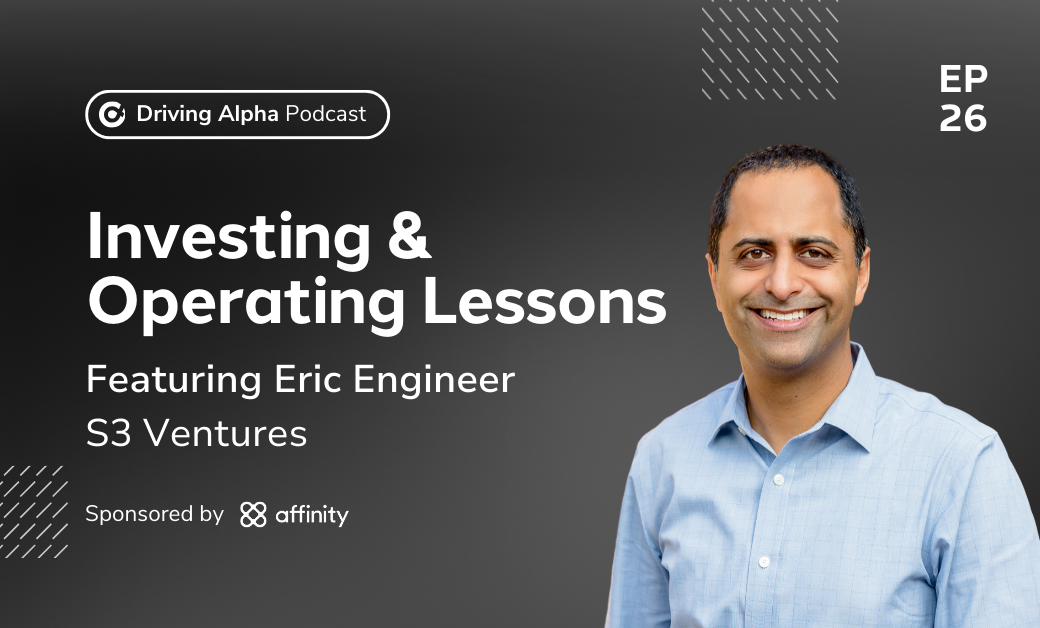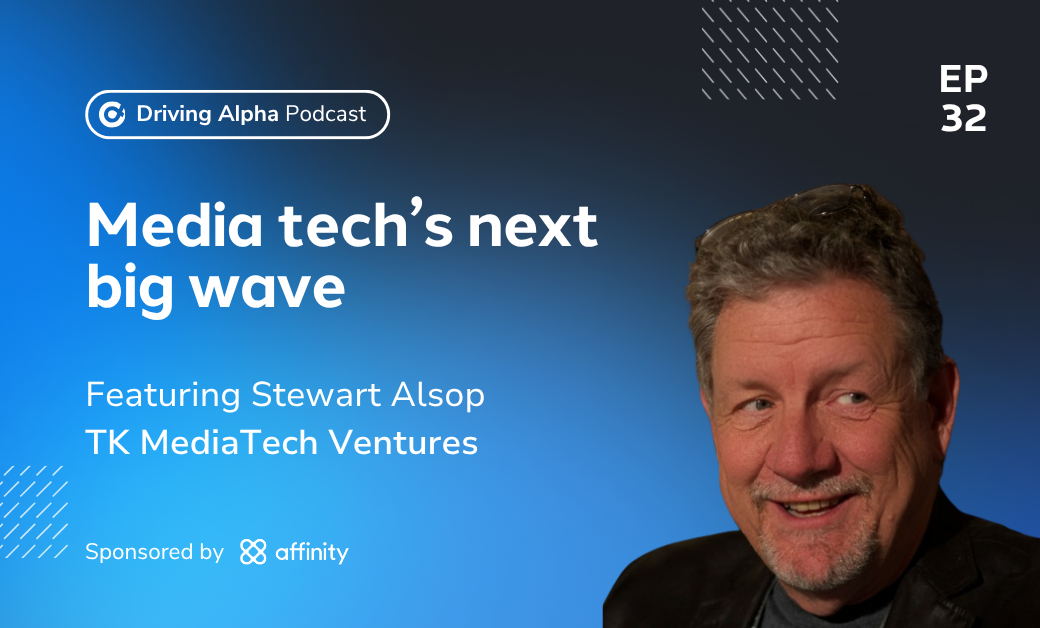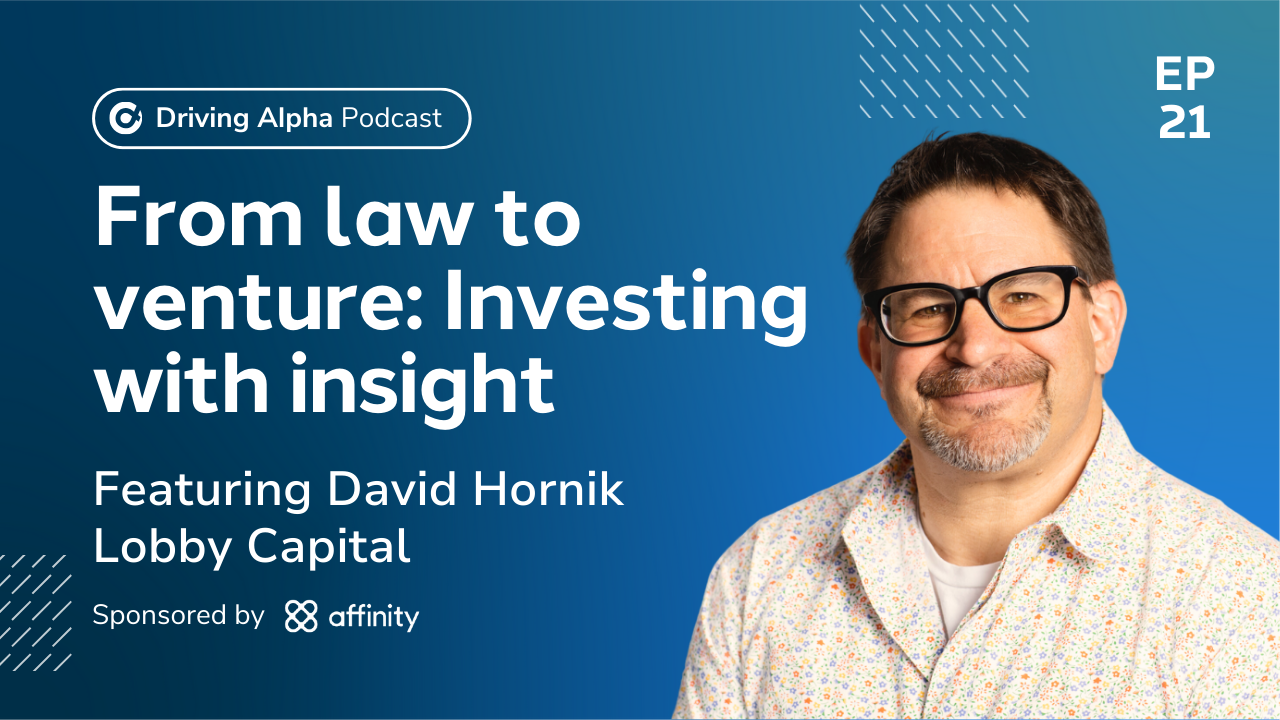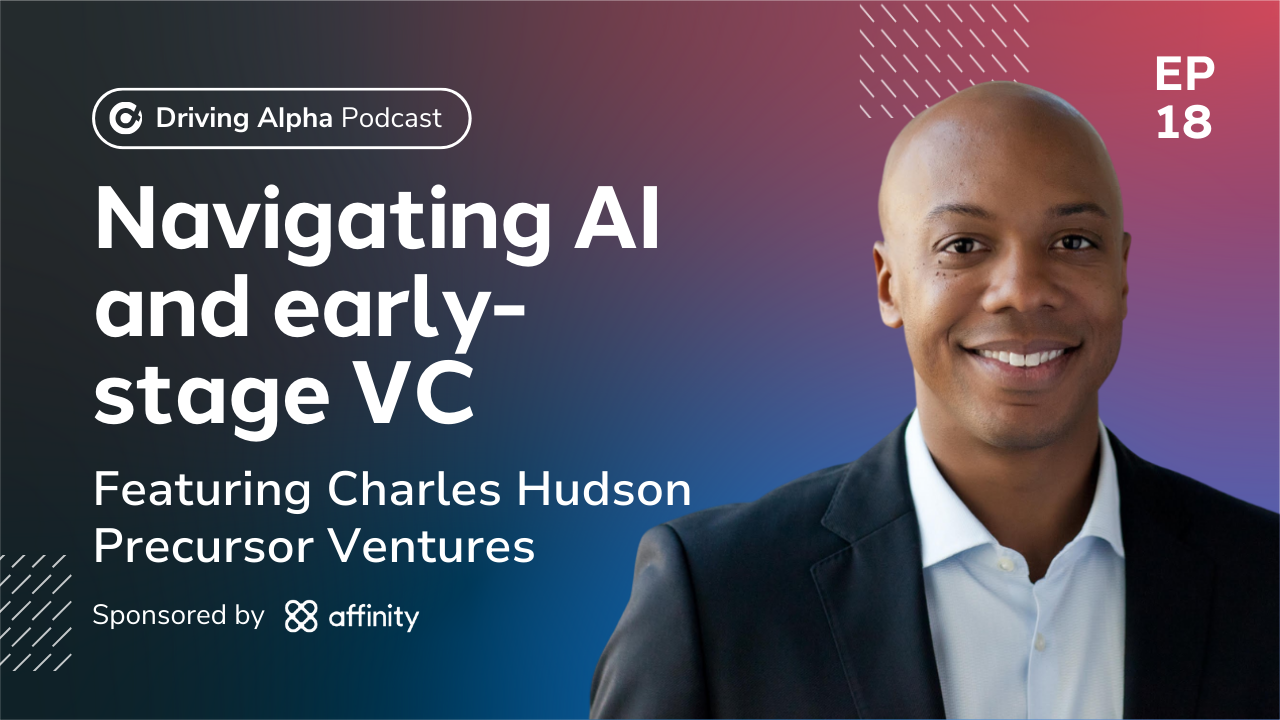Steve Brotman: Welcome to Driving Alpha, the podcast where we dive deep into the minds shaping the future of venture capital and technology. Today’s guest is Eric Engineer, partner at S3 Ventures, one of the largest venture capital firms in Texas, with a mission to fuel transformative companies and drive outsize returns. Eric’s journey is a masterclass in versatility and leadership across the tech and investment landscape. Raised in Houston, Eric earned his BA in Computer Science from Rice University before going on and getting his MBA from Harvard Business School. He began his career as a sales engineer at Trilogy in Austin, and then he held pivotal product and enterprise roles at Microsoft, gaining a unique perspective on innovation from one of the largest tech giants. Eric’s entrepreneurial spirit led him to serve as CEO of Voto, a pioneering video commerce company where he guided the business to a successful acquisition in 2018. Before joining S3, he was a partner at Sevin Rosen, helping lead investments in high growth startups. Since joining S3 in 2018, Eric has become a driving force behind some of the firm’s most significant deals, including QBD Vision, RPO. Some of the other companies that S3 is known for are Alchemy and Levelset, which we’ll get into and talk a little bit about later in the pod. Eric’s broad experience from corporate tech to startup CEO to VC partner gives him a rare lens on what it takes to drive alpha in today’s market. He’s navigated downturns, upturns, steered companies through acquisition, and now empowers the next generation of founders to scale with purpose. Get ready for an insightful conversation on venture investing, building resilient companies, and the art of driving alpha right here with Eric Engineer of S3 Ventures. Welcome, Eric.
Eric Engineer: Thanks, Steve. Great to be with you, and good to see you. I know I get to see you at least once a year when you come down to Austin for South by, and I know you’re a big champion of the Austin area and the venture ecosystem here as well. So, thank you to you and Alpha for having me.
Steve Brotman: It’s been fun growing our relationship with S3 over the last, must be seven or eight—
Eric Engineer: Yeah. Yep.
Steve Brotman: You guys host that dinner every year during South By. We do try and make it down a few times a year to Austin. It’s just remarkable. We started coming down about 10 years ago, and it’s just remarkable how the ecosystem has grown. I just got off a call with a fellow entrepreneur and VC now who just recently moved from LA to Austin, and he just said how welcoming the VC community has been to him. That’s phenomenal. That’s exactly what we found when we came down to Austin. And it’s super important to just be present when you come—when, you know, we’re based in New York. But just coming on a regular basis and being consistent is super important, and I think highly valuable. Talking about consistency, you’ve been doing this for a while. Just curious, how did you get into venture capital? Like, being an operator is very different than going to the dark side. How did that happen?
Eric Engineer: As you know, there’s no single path into venture, and mine was definitely circuitous. I always had a technical background. Like you said, I studied computer science undergrad, and my very first job out of school was here in Austin at Trilogy Software during the dot-com bubble. And that’s where I kind of got a little bit of the bug of being part of a fast-growing business and just seeing very entrepreneurial people coming together. That company has really left a mark on the Austin ecosystem. Just really recruited some fantastic folks to the area 20-something years ago, and the legacy still continues. But that was kind of the first little taste I got of that intersection. But of course, the dot-com bubble burst, and I fled to safety and went to Microsoft and learned a ton there. But in the back of my mind, I always really enjoyed that kind of early stage. I actually, at Microsoft, worked on the developer tools for the early mobile devices. You’ll probably remember the Pocket PC and the very first smartphones. And so as a product manager for that, I worked with startups all the time because it was either hobbyist startups and maybe a few enterprises playing around with those devices at the time. And so I stayed close to that whole startup ecosystem that way.
When I went to business school, I said, “Hey, I think I want to check out venture capital.” And so I looked in the alumni databases for Rice and HBS, and my newlywed wife at the time was hell-bent on getting us back to Texas. I didn’t think it was even possible at the time. Venture was really Boston and Silicon Valley—not even San Francisco, right? Silicon Valley and Boston. And that was it. I was like, “Okay, I’ll try.” And I think the stars aligned for me because the same name was in both databases—a guy named John Jaggers, who was managing partner at Sevin Rosen Funds, which was an iconic 30-year-old firm that had been in Palo Alto and in Dallas because Dallas was really an innovation hub for a lot of semiconductor, telecommunications infrastructure, the like. And so I just cold outreached to him. He gave me an internship after I came down and talked to the rest of the team. That internship turned into a full-time job, and that was my first foray into venture.
Then I took this detour that you mentioned—being a CEO of a portfolio company of Sevin Rosen’s that also happened to be a portfolio company of S3. My partner Brian—his very first fund—was one of his early investments. And so I got to know him. Someone that was on our board, and we formed a good relationship, and he asked me to join after we sold the business in ’18. Back and forth.
Steve Brotman: Amazing.
Eric Engineer: Yeah.
Steve Brotman: Well, it’s sort of a bit of a journey, right?
Eric Engineer: Been, yes.
Steve Brotman: I mean, it’s—but did it take you a while to dry out from being an operator, being able to call the shots, to being a venture capitalist where you’re—
Eric Engineer: It’s interesting. I feel so lucky that I found the role that I have here where I actually serve two roles. I’m an investing partner—I probably have like 10 investments or so that I work with—but I also oversee a good amount of our operations. So all of the junior investment professionals report to me. Our marketing and our talent functions report to me. And we went through a pretty dramatic kind of transformation as a firm, both in terms of our scale up, where we went from a single partner to four partners and a principal that write checks. That’s a pretty big change for an organization. And being part of that has been really fun. But then also in terms of our market presence and our branding and everything like that—we reinvented a lot of that over the last seven years. And so I feel really, that’s probably what I’m most proud of, is the team and the rebranding efforts that we’ve done as a firm. And that’s been building. And so I get to scratch both itches, if you will, as an operator and as an investor still in this role.
Steve Brotman: Awesome. I started my career as a software engineer, and then built some software, founded a company, competed against Elon Musk, but I realized that I wasn’t such a great operator and I hired a great team. It worked out in the end. But tell me more about how does that influence your investment style?
Eric Engineer: Yeah. I don’t know if it’s good or bad, right? I think there’s definitely pros and cons to having that background. I definitely feel like I’m able to connect with founders. I think it helps us win—it helps me win deals, frankly. I’ve been told that from folks that have chosen us in more competitive situations. I think there is a little bit more of that kind of empathy and understanding of what it really takes and how stressful it can be and all that’s involved emotionally and psychologically when it comes to running a business in terms of the ups and downs. That has definitely been helpful. And sometimes you can go down into the details when you’re getting—try to be really tactical. Even in a board meeting, sometimes you get very tactical and try to solve for certain things. And so I think that has been very helpful.
I think the danger has been also, though, sometimes you maybe do want to just solve the problem and you have to remember that no—as someone on the board, your job is to make sure the right people are solving the problems and not you. That has been something that I’ve just tried to find a balance over the years.
Steve Brotman: Interesting. So pretty helpful overall.
Eric Engineer: I think so. Yeah.
Steve Brotman: It’s becoming more and more critical to know what the engine room looks like a little bit before you start poking around. Before I leave that topic, has that influenced sort of what you look for in entrepreneurs as you’re looking at opportunities?
Eric Engineer: Definitely that resilience—both the mental resilience and, frankly, even the physical resilience. That’s something that I am learning, that my partner Brian, who started the firm 20 years ago, has told me before and I didn’t really fully comprehend it—though I had lived it actually. I had so much stress as a CEO, I even got a mild case of shingles during the whole thing, right? I mean, I’ve been through it, and I know the physical toll that it can also play on people. And so I do start to appreciate: have people been through that adversity and come out the other side? Do they have a support structure around them, whether it’s their family or whatever, that’s really in it for the long haul?
I’m also learning about if a company has been at it for six or seven years, is the CEO really gonna be up for another six or seven years? That’s an important question versus things that are just started. And those are little things that I’m starting to get more tuned to and understand the importance of and have those conversations upfront with founders. So that’s something that’s definitely informed me.
The other thing I think is just the importance of hiring—and is the founder able to attract and bring on people alongside him or her that can really level up the team versus just have people that are maybe less experienced below? And that is something I’ve started to really hone in on. And those are very kind of operator, people-oriented things that I think, at the end of the day, is what it comes down to.
Steve Brotman: Looking forward a little bit, what excites you about the current market, sector, area?
Eric Engineer: Man, it reminds me… Yeah, I mentioned I’ve kind of been through these cycles. When I started my career, it was in the peak of the dot-com bubble. I got paid more in my first year out of school than I did five years later—you understand what I saw there. So kind of seeing those ups and downs, but the internet excitement and then actually the mobile excitement that I experienced as being very early on in the mobile journey when I was at Microsoft—it very much reminds me of those periods.
AI is really helping people reimagine everything again—not only software, but things like work generally. So it definitely feels like a massive platform shift and has been very re-energizing for me. Because if I think back five or six years ago, all you were really doing back then was like, “Okay, where hasn’t SaaS penetrated yet?” Or “Where hasn’t cloud penetrated?” And you’re going into these industries that have been slow to digitize, which I still think is a great opportunity. I had a lot of investments—as has S3—in those things. But now AI opens up everything again, and you kind of think, “Oh, is there going to be another whole shift that happens?” And so it’s just fun to see that, and it kind of makes you feel younger.
Steve Brotman: Yeah, you get more shots at glory, right?
Eric Engineer: Just another wave, right? Which is fun. Yeah, yeah.
Steve Brotman: I mean, a lot of firms stumble on that—the shift from client-server to software to SaaS-enabled stuff to mobile.
Eric Engineer: Well actually, Steve, it’s funny you mention that. I witnessed that at Sevin Rosen Funds. They had been around 30 years. And there were other dynamics there in terms of this as partnerships grow and stuff like that. But one of the things that was hard, at least with half the team in Dallas—where it really wasn’t the hotbed of the internet—you didn’t really get to be part of that wave. And I think that’s actually what I feel is so different even about Texas today. I don’t feel like I’m missing the wave now. There’s definitely not the same level at the infrastructure layer of AI as there is in the Valley here—that’s just a fact. But all the other layers—it’s happening worldwide. And so I don’t feel like you don’t have access. And so that’s really exciting. So that definitely feels like it’s very different this go-around.
Steve Brotman: Segue to talk a little bit more about the Texas market. It’s historically a flyover area 20 or 30 years ago. Why don’t you share more about your perspective, because you’ve lived it?
Eric Engineer: Definitely. Texas, I have to remind people, actually has an incredibly rich history and legacy around technology—going back 60, 70 years. A lot of semiconductor, Compaq Computer, Dell Computer—I mean, a lot of networking companies have come out of here. Texas Instruments obviously, which is part of the origins of Sevin Rosen Funds itself. Long history. Obviously space has been here forever as well. And healthcare—it’s been a center of healthcare and energy for a long time. So lots of innovation has happened here over the years. And there have definitely been these kinds of peaks and valleys as it relates to venture capital investment and focus on Texas.
But I do feel—obviously accelerated by the big migrations that happened around COVID—but it definitely feels like Austin in particular, but Texas overall, has reached a different level where I feel it has a lot more staying power. The thing that is interesting is, obviously, it starts with talent. There’s so many people moving here for multiple reasons, right? And so just every day I’m meeting new talented folks that are one, two, three years in Austin and of all types. And so that is very new. And historically, if you moved here it was because of a family member or something like that. Here it’s people picking a spot on the map. They just heard about Austin and visited and fell in love and came. And so that story I hear over and over again—that is very different.
But then the other thing that I feel gives us lasting power this time around is just the diversity of startups that go well beyond what we invest in at S3. We’re B2B software and some med device healthcare, but if you look at what’s happening in defense tech, in space, in robotics, in energy transition, and all healthcare broadly—CPG also—we’ve had two or three billion-dollar exits in CPG alone in the last few years. It’s just mind-blowing to me, and I love that because I always think innovation happens at the intersection of things. And just having all these talented people who’ve worked in these different spaces coming together—then the Fortune 500 companies that are here in all these industries that are now digitizing—it’s just a really interesting mix that I feel lucky to be part of.






